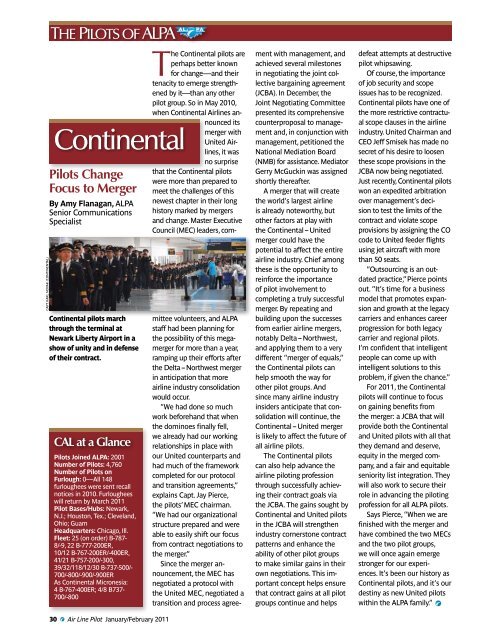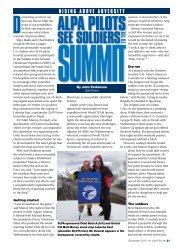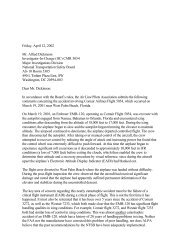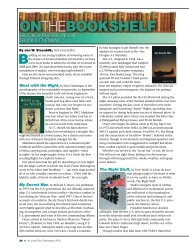The Pilots of ALPA - Air Line Pilots Association
The Pilots of ALPA - Air Line Pilots Association
The Pilots of ALPA - Air Line Pilots Association
Create successful ePaper yourself
Turn your PDF publications into a flip-book with our unique Google optimized e-Paper software.
CAPT. KARL NOVAK (CONTINENTAL)<br />
THE PILOTS OF <strong>ALPA</strong><br />
Continental<br />
<strong>Pilots</strong> Change<br />
Focus to Merger<br />
By Amy Flanagan, <strong>ALPA</strong><br />
Senior Communications<br />
Specialist<br />
Continental pilots march<br />
through the terminal at<br />
Newark Liberty <strong>Air</strong>port in a<br />
show <strong>of</strong> unity and in defense<br />
<strong>of</strong> their contract.<br />
CAL at a Glance<br />
<strong>Pilots</strong> Joined <strong>ALPA</strong>: 2001<br />
Number <strong>of</strong> <strong>Pilots</strong>: 4,760<br />
Number <strong>of</strong> <strong>Pilots</strong> on<br />
Furlough: 0—All 148<br />
furloughees were sent recall<br />
notices in 2010. Furloughees<br />
will return by March 2011<br />
Pilot Bases/Hubs: Newark,<br />
N.J.; Houston, Tex.; Cleveland,<br />
Ohio; Guam<br />
Headquarters: Chicago, Ill.<br />
Fleet: 25 (on order) B-787-<br />
8/-9, 22 B-777-200ER,<br />
10/12 B-767-200ER/-400ER,<br />
41/21 B-757-200/-300,<br />
39/32/118/12/30 B-737-500/-<br />
700/-800/-900/-900ER<br />
As Continental Micronesia:<br />
4 B-767-400ER; 4/8 B737-<br />
700/-800<br />
30 <strong>Air</strong> <strong>Line</strong> Pilot January/February 2011<br />
<strong>The</strong> Continental pilots are<br />
perhaps better known<br />
for change—and their<br />
tenacity to emerge strengthened<br />
by it—than any other<br />
pilot group. So in May 2010,<br />
when Continental <strong>Air</strong>lines announced<br />
its<br />
merger with<br />
United <strong>Air</strong>lines,<br />
it was<br />
no surprise<br />
that the Continental pilots<br />
were more than prepared to<br />
meet the challenges <strong>of</strong> this<br />
newest chapter in their long<br />
history marked by mergers<br />
and change. Master Executive<br />
Council (MEC) leaders, com-<br />
mittee volunteers, and <strong>ALPA</strong><br />
staff had been planning for<br />
the possibility <strong>of</strong> this megamerger<br />
for more than a year,<br />
ramping up their efforts after<br />
the Delta–Northwest merger<br />
in anticipation that more<br />
airline industry consolidation<br />
would occur.<br />
“We had done so much<br />
work beforehand that when<br />
the dominoes finally fell,<br />
we already had our working<br />
relationships in place with<br />
our United counterparts and<br />
had much <strong>of</strong> the framework<br />
completed for our protocol<br />
and transition agreements,”<br />
explains Capt. Jay Pierce,<br />
the pilots’ MEC chairman.<br />
“We had our organizational<br />
structure prepared and were<br />
able to easily shift our focus<br />
from contract negotiations to<br />
the merger.”<br />
Since the merger announcement,<br />
the MEC has<br />
negotiated a protocol with<br />
the United MEC, negotiated a<br />
transition and process agree-<br />
ment with management, and<br />
achieved several milestones<br />
in negotiating the joint collective<br />
bargaining agreement<br />
(JCBA). In December, the<br />
Joint Negotiating Committee<br />
presented its comprehensive<br />
counterproposal to management<br />
and, in conjunction with<br />
management, petitioned the<br />
National Mediation Board<br />
(NMB) for assistance. Mediator<br />
Gerry McGuckin was assigned<br />
shortly thereafter.<br />
A merger that will create<br />
the world’s largest airline<br />
is already noteworthy, but<br />
other factors at play with<br />
the Continental–United<br />
merger could have the<br />
potential to affect the entire<br />
airline industry. Chief among<br />
these is the opportunity to<br />
reinforce the importance<br />
<strong>of</strong> pilot involvement to<br />
completing a truly successful<br />
merger. By repeating and<br />
building upon the successes<br />
from earlier airline mergers,<br />
notably Delta–Northwest,<br />
and applying them to a very<br />
different “merger <strong>of</strong> equals,”<br />
the Continental pilots can<br />
help smooth the way for<br />
other pilot groups. And<br />
since many airline industry<br />
insiders anticipate that consolidation<br />
will continue, the<br />
Continental–United merger<br />
is likely to affect the future <strong>of</strong><br />
all airline pilots.<br />
<strong>The</strong> Continental pilots<br />
can also help advance the<br />
airline piloting pr<strong>of</strong>ession<br />
through successfully achieving<br />
their contract goals via<br />
the JCBA. <strong>The</strong> gains sought by<br />
Continental and United pilots<br />
in the JCBA will strengthen<br />
industry cornerstone contract<br />
patterns and enhance the<br />
ability <strong>of</strong> other pilot groups<br />
to make similar gains in their<br />
own negotiations. This important<br />
concept helps ensure<br />
that contract gains at all pilot<br />
groups continue and helps<br />
defeat attempts at destructive<br />
pilot whipsawing.<br />
Of course, the importance<br />
<strong>of</strong> job security and scope<br />
issues has to be recognized.<br />
Continental pilots have one <strong>of</strong><br />
the more restrictive contractual<br />
scope clauses in the airline<br />
industry. United Chairman and<br />
CEO Jeff Smisek has made no<br />
secret <strong>of</strong> his desire to loosen<br />
these scope provisions in the<br />
JCBA now being negotiated.<br />
Just recently, Continental pilots<br />
won an expedited arbitration<br />
over management’s decision<br />
to test the limits <strong>of</strong> the<br />
contract and violate scope<br />
provisions by assigning the CO<br />
code to United feeder flights<br />
using jet aircraft with more<br />
than 50 seats.<br />
“Outsourcing is an outdated<br />
practice,” Pierce points<br />
out. “It’s time for a business<br />
model that promotes expansion<br />
and growth at the legacy<br />
carriers and enhances career<br />
progression for both legacy<br />
carrier and regional pilots.<br />
I’m confident that intelligent<br />
people can come up with<br />
intelligent solutions to this<br />
problem, if given the chance.”<br />
For 2011, the Continental<br />
pilots will continue to focus<br />
on gaining benefits from<br />
the merger: a JCBA that will<br />
provide both the Continental<br />
and United pilots with all that<br />
they demand and deserve,<br />
equity in the merged company,<br />
and a fair and equitable<br />
seniority list integration. <strong>The</strong>y<br />
will also work to secure their<br />
role in advancing the piloting<br />
pr<strong>of</strong>ession for all <strong>ALPA</strong> pilots.<br />
Says Pierce, “When we are<br />
finished with the merger and<br />
have combined the two MECs<br />
and the two pilot groups,<br />
we will once again emerge<br />
stronger for our experiences.<br />
It’s been our history as<br />
Continental pilots, and it’s our<br />
destiny as new United pilots<br />
within the <strong>ALPA</strong> family.”





